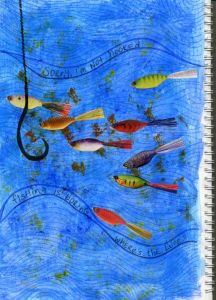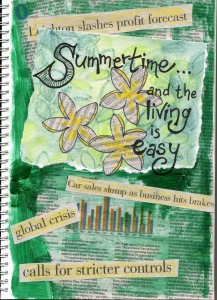You know what bugs me? When writers set up the “rules” of their world and then proceed to break them without consequence. Even if it’s only a teeny bending rather than a break, it spoils the story for me. It makes me stop suspending disbelief and start actively hunting for plot flaws.
I found one such instance in my own Dragonheart, when I was rereading it last month to remind myself of the story so far. After carefully setting up that human blood mages like my heroine would only use their magic against the fey, never other humans, I proceeded to write a scene in which she slaughtered no less than five people with magic because they were ambushing her. That one’s definitely going to need a rewrite!
Can’t believe I did it – but still, I picked it up before the first draft is even finished. How do such things get into finished, supposedly polished, pieces?
Take Blade, for instance, an action/horror movie. Tortured vigilante hero hunts down vampires. Not my usual choice in a movie, but it was entertaining enough for mindless Friday night viewing. Until, that is, they started breaking their own rules.
Why bother saying sunlight kills vampires if you’re going to have your vampire characters walking around in broad daylight? You can’t have one vampire dissolved by sunlight and another walking and talking in the daytime because he’s wearing sunblock.
Sunblock. I kid you not. The Carnivore and I were howling with laughter. What would that have to be? SPF 30,000? And the vampire put it on his eyes, right? And the inside of his mouth?
Oh, and for most of the movie vampires are so hard to kill our hero has to go to amazing lengths, yet near the end our plucky heroine sprays one with garlic juice and its head explodes. Uh huh.
Nor is it just fantasy that’s guilty. I watched a BBC production called Lost in Austen recently, about a modern girl who magically changes places with Elizabeth Bennet and ends up in the events of Pride and Prejudice. Well, I guess that’s fantasy too, but my objections had to do with the societal rules that got twisted to suit the plot, not the fantasy element. As if a gentleman like Mr Bingley, having asked Jane Bennet to dance, would then refuse to stand up with her because Darcy warned him she was after his money. To do so would have been unpardonably rude. He might have danced with her and behaved rather frostily, but I can’t believe he would have snubbed her outright. The rules of polite behaviour just wouldn’t allow it.
Not to mention the many things the modern heroine did and said that should have had her cast out of polite society. Or the fact that everyone accepted her sudden appearance and Lizzy’s disappearance. It’s a society where women are closely guarded, yet no one blinks an eye when Lizzy disappears without trace or warning.
Not that I didn’t enjoy it. I did, it was a lot of fun, and not to be taken seriously, I guess. But still, why not follow the “rules” of the society? Just because it makes a more dramatic scene for Bingley to refuse to dance with Jane? But if the viewers are going to sit there and say “but hang on a minute, that doesn’t make sense” is it worth going for drama over logic?
Maybe I’m just getting too picky in my old age. I hardly ever watch TV, but lately it seems that I’m picking holes in everything I watch. Does it really matter if entertainment isn’t internally consistent? Maybe not. But I can’t help feeling that if the writers made the extra effort to obey their own rules, they might come up with ideas that were even better.
Or at least that didn’t leave their audience in stitches when they weren’t intending to be funny.








